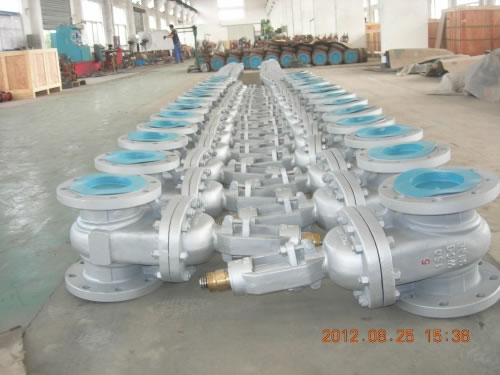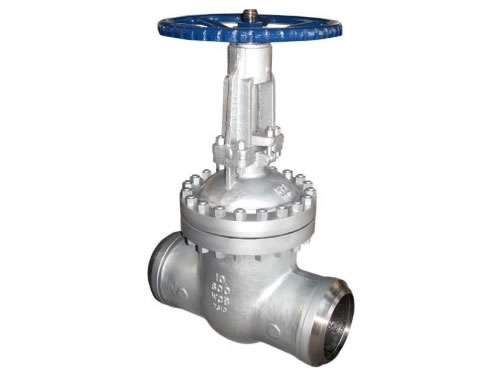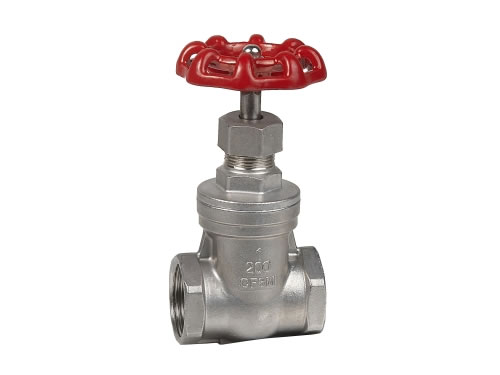- Ball Valves
- Flanged Floating Ball Valve
- Trunnion Mounted Ball Valves
- Threaded Ball Valves
- Welded End Ball Valves
- Gate Valves
- Flanged Gate Valves
- Welded Gate Valves
- Threaded Gate Valves
- Globe Valves
- Flanged Globe Valves
- Weld End Globe Valves
- Threaded Globe Valves
- Check Valves
- Flanged Check Valves
- Welded Ends Check Valves
- Threaded Check Valves
- Y Type Strainers
- Flanged Y Type Strainers
- Threaded Y Type Strainers
- Forged Steel Valves
- Flanged Forged Steel Valves
- Threaded Forged Steel Valves
- Welded Ends Forged Steel Valves

- Flanged Gate ValvesFlanged gate valves, also known as flanged sluice valves, are mainly used for permitting or preventing the flow of liquids in pipelines. Kayson’s valves have passed API 6D / CE certification. And those API 6D gate valves are widely applied in the fields of tap water, sewage, construction, petroleum, chemical, food, medicine, textile, electric power, shipbuilding, metallurgy...

- Welded Gate ValvesWelded gate valves, also known as weld end gate valves or welded sluice valves, can be fully opened and closed. They are primarily used to permit or prevent the flow of liquids, but typically, they should not be used for regulating flow, unless they are specifically designed for that purpose. If used to regulate flow, the sealing surface will be damaged because of...

- Threaded Gate ValvesThreaded gate valves, also known as screwed gate valves, are mainly used for allowing or preventing the flow of liquids in pipelines. Kayson’s valves have passed API 6D / CE certification. And those API 6D gate valves are widely applied in the fields of tap water, sewage, construction, petroleum, chemical, food, medicine, shipbuilding, textile, electric power, metallurgy...
Gate Valves
Description
Gate valve, also named as sluice valve, can be fully opened and closed by lifting a round or rectangular gate. It is primarily used to permit or prevent the flow of liquids, but typically, it should not be used for regulating flow, unless they are specifically designed for that purpose. If used to regulate flow, the sealing surface will be damaged because of a relatively high fluid velocity. Commonly, pipeline gate valves are designed to be fully opened or closed. When fully open, sluice valves have no obstruction in the flow path, resulting in very low friction loss.
Application
Due to their ability to cut through liquids, gate valves are often used in such pipelines in the fields of tap water, sewage, construction, petroleum, chemical, food, medicine, textile, electric power, shipbuilding, metallurgy, energy system, etc. Although these valves keep pressure loss and fluid resistance at a low level, they can only be used for on-off applications.
Advantages
1. The opening torque of sluice valves is small, leading a long service life.
2. Valve body of pipeline gate valves is cast in precision, having high corrosion resistance.
3. Valves’ surface is processed twice, so it is smooth and fine in appearance.
4. Valve clacks are machined by CNC.
5. Sluice valves are convenient and fast to maintain.
6. Our gate valves are API 6D / CE certified.
Features
1. Minimum flow restriction. Because fluids in sluice valves are often flowing in a straight-line direction.
2. Easy to open and close.
3. Very low frequency of water hammer phenomenon.
4. Convenient to install.
5. Higher in price than check valves. Because gate valves have a lot of parts, and sealing surfaces are complicated to process.
Maintenance
1. Hand wheel, handle, and transmission structure of sluice valves cannot be hoisted. And collision is prohibited.
2. Dual gate valves should be installed vertically, that’s to say, the stem is in vertical direction and handle wheel is at the top.
3. If sluice valves have by-pass valve, the by-pass valve should be open first to balance the pressure of entrance and exit.
4. Please install those pipeline gate valves with transmission structure according to operating manual.
5. If sluice valves are used frequently, please lubricate them at least once per month.
Attention
1. Before installing gate valves, please check valve body, sealing surface and other parts to avoid any dirt attachment.
2. Bolts at any connection joint should be fastened.
3. Check the packing part to ensure the sealing performance and ensure sluice valves to open flexibly.
4. Customers should pay attention to valve type, connection size and flowing direction of fluids, to guarantee consistency with the pipeline gate valve to be installed.
5. When installing, some space should be left for the sluice valve to actuate.
6. The connection of actuating device should be strictly conformed to circuit diagram.
7. Gate valves should be maintained regularly. Avoid collision or extrusion.
Payment, Package and Transportation
1) Payment such as T/T, D/P, D/A, L/C is accepted.
2) Gate valves are packed in standard wooden boxes.
3) We deliver our sluice valves by railway, sea, or airplane.
Specification of API Gate Valves
| Design and Manufacture | Face to Face / End to End | Flange Dimension | Butt Welding Dimension | Pressure Temperature Test | Inspection and Test |
| API 600 | ANSI B16.10 | ANSI B16.5 | ANSI B16.25 | ANSI B16.34 | API 598 |
| API 6D | API 6D | ANSI B16.5 | ANSI B16.25 | ANSI B16.34 | API 6D |